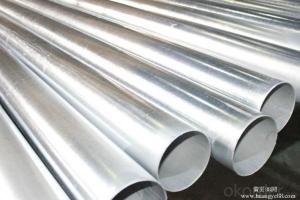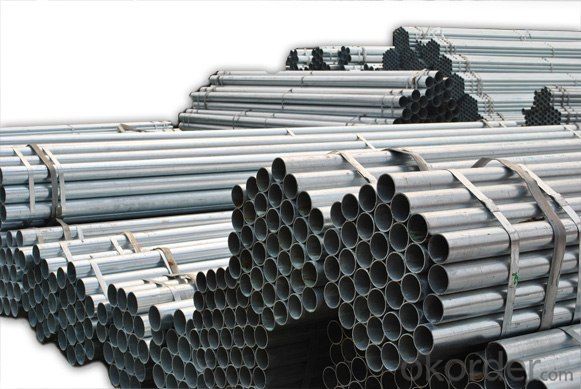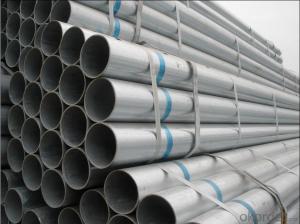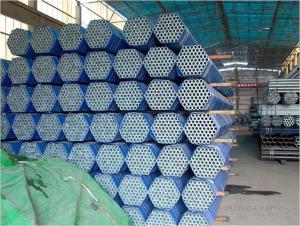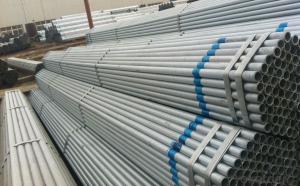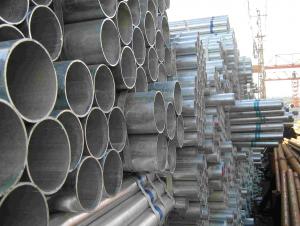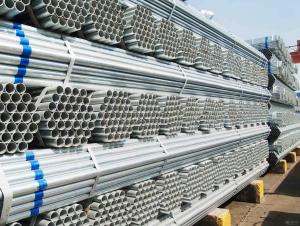Hot Dipped Galvanized Steel Pipe BS1387 Pipe
- Loading Port:
- Tianjin
- Payment Terms:
- TT OR LC
- Min Order Qty:
- 25 m.t.
- Supply Capability:
- 7500 m.t./month
OKorder Service Pledge
OKorder Financial Service
You Might Also Like
1、Structure of Hot Dipped Galvanized Steel Pipe BS1387 :
The surface of Hot Dipped Galvanized Steel Pipe BS1387 can increase the corrosion resistance of the steel tube, prolong service life. Galvanized pipe is widely used, in addition to water, gas, oil and other general low pressure fluid pipelines. It is also used in the petroleum industry, especially for offshore oil field of oil well pipe and oil pipe, chemical, coking equipment of oil heater, condensation cooler, coal run oil exchanger tube, and trestle pile, the mine tunnel support frame tube.
2、Main Features of Hot Dipped Galvanized Steel Pipe BS1387 :
• High manufacturing accuracy
• High strength
• Good visual effect
• Reasonable price
• Small inertia resistance
• Strong heat dissipation ability
3、Hot Dipped Galvanized Steel Pipe BS1387 Specification:
Standard | GB, DIN, ASTM ASTM A106-2006, ASTM A53-2007 |
Grade | 10#-45#, 16Mn 10#, 20#, 45#, 16Mn |
Thickness | 1 - 33 mm |
Section Shape | Round |
Outer Diameter | 21 - 610mm |
Place of Origin | Tianjin, China (Mainland) |
Secondary Or Not | Non-secondary |
Application | Hydraulic Pipe |
Technique | Cold Drawn |
Certification | API |
Surface Treatment | factory state or painted black |
Special Pipe | API Pipe |
Alloy Or Not | Non-alloy |
Length | 5-12M |
Outer Diameter | 21.3-610mm |
Grade | 20#, 45#, Q345, API J55, API K55, API L80, API N80, API P110, A53B |
Standard | ASME, ASTM |
1) Material:20#(ASTM A 106/A53 GRB.API5LGRB,GB),45#,16Mn,10#.
2) Specification range:OD:21.3-610mm,WT:6-70mm,length:6-12m or according to the requirement of clients.
3) Excutive standards:GB,ASME API5L.ASTM A 106/A53,Despite of the above standards,we can also supply seamless steel pipe with standard of DIN,JIS,and so on,and also develop new products according to the requirements of our clients!
4) Surface:black lacquered,varnish coating or galvanized.
5) Ends:Beveled or square cut,plastic capped,painted.
6) Packing:bundles wrapped with strong steel strip,seaworthy packing.
4、Packaging & Delivery
Packaging Details: | seaworthy package,bundles wrapped with strong steel strip |
Delivery Detail: | 15-30days after received 30%TT |
5、FAQ of Hot Dipped Galvanized Steel Pipe BS1387 :
①How is the quality of your products?
Our products are manufactured strictly according to national and internaional standard, and we take a test
on every pipe before delivered out. If you want see our quality certifications and all kinds of testing report, please just ask us for it.
Guaranteed: If products’ quality don’t accord to discription as we give or the promise before you place order, we promise 100% refund.
②How about price?
Yes, we are factory and be able to give you lowest price below market one, and we have a policy that “ for saving time and absolutely honest business attitude, we quote as lowest as possible for any customer, and discount can be given according to quantity”,if you like bargain and factory price is not low enough as you think, just don’t waste your time.Please trust the quotation we would give you, it is professional one.
③Why should you chose us?
Chose happens because of quality, then price, We can give you both.Additionally, we can also offer professional products inquiry, products knowledge train(for agents), smooth goods delivery, exellent customer solution proposals.Our service formula: good quality+good price+good service=customer’s trust
SGS test is available, customer inspection before shipping is welcome, third party inspection is no problem.
6、 Hot Dipped Galvanized Steel Pipe BS1387 : Images:
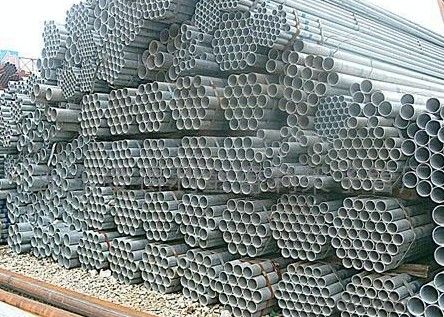
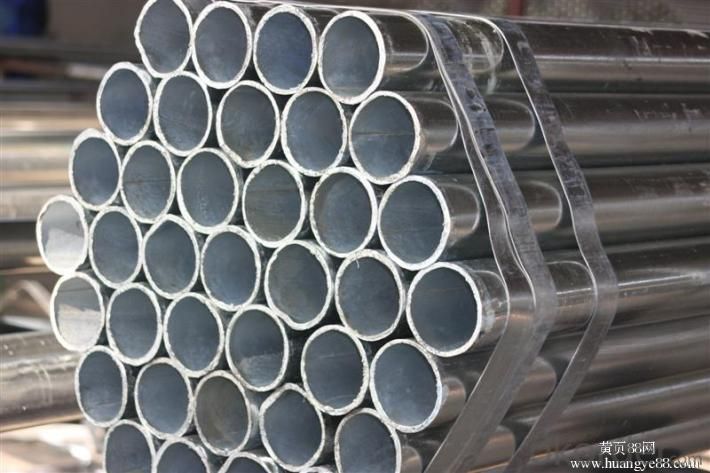
- Q: What is the average lifespan of a steel pipe?
- The average lifespan of a steel pipe can vary depending on various factors such as its quality, usage conditions, maintenance, and exposure to external factors. However, on average, a properly installed and maintained steel pipe can last anywhere from 20 to 100 years or more.
- Q: What is the standard length of steel pipes?
- The standard length of steel pipes varies depending on the industry and application. However, common standard lengths for steel pipes range from 18 to 22 feet, with some variations based on specific requirements or international standards.
- Q: How many fasteners are there in a ton of steel tubes?
- The fastener generally refers to the intermediate connecting parts connecting two members, in the construction project for external diameter of steel pipe scaffold with 48mm fixation, the fastener is divided into rectangular fastener (cross directional fastener fastener) rotary fastener (universal movable fastener fastener) (a direct docking fastener fastener fastener) etc..
- Q: What does "spiral welded steel pipe" DN325*10 mean?
- Labeling is wrong: it should be said for 325*10, the diameter of pipe wall thickness of 10, 325;For example, the nominal diameter shall be: DN300.
- Q: How are steel pipes used in the manufacturing of chemical storage tanks?
- Steel pipes are commonly used in the manufacturing of chemical storage tanks as they provide durability, strength, and corrosion resistance. These pipes are utilized for the construction of the tank's framework and support system, ensuring stability and structural integrity. Additionally, steel pipes are often employed for the installation of inlet and outlet connections, allowing for the safe and efficient transfer of chemicals in and out of the tank.
- Q: What are the common standards for coating and lining of steel pipes?
- The common standards for coating and lining of steel pipes are outlined by various organizations and regulatory bodies to ensure the durability, corrosion resistance, and overall quality of the pipes. Some of the widely recognized and used standards include: 1. American Society for Testing and Materials (ASTM): ASTM has developed numerous standards for coating and lining of steel pipes, such as ASTM A775/A775M for epoxy-coated reinforcing steel, ASTM A1064/A1064M for metallic-coated steel wire, and ASTM A1057/A1057M for fusion-bonded epoxy-coated steel reinforcement. 2. American Water Works Association (AWWA): AWWA has established several standards for coating and lining of steel pipes used in the water industry. Examples include AWWA C210 for liquid epoxy coating systems for the interior and exterior of steel water pipelines, and AWWA C213 for fusion-bonded epoxy coating for the interior and exterior of steel water pipelines. 3. National Association of Corrosion Engineers (NACE): NACE International develops standards and recommended practices for the corrosion control of steel pipes. NACE SP0169 provides guidelines for selection and application of coatings for underground or submerged steel pipelines, while NACE SP0198 offers recommendations for external coatings of steel pipelines. 4. ISO Standards: The International Organization for Standardization (ISO) has developed various standards related to coating and lining of steel pipes. ISO 21809-1 specifies the requirements for external coatings applied to buried or submerged pipelines, while ISO 21809-2 focuses on the internal coating and lining of such pipelines. These standards cover different aspects of the coating and lining process, including surface preparation, application methods, minimum coating thickness, adhesion, and quality control. Adhering to these standards ensures that steel pipes are properly protected against corrosion, abrasion, and other forms of deterioration, leading to longer service life and enhanced performance in various industries such as oil and gas, water supply, and infrastructure.
- Q: What are the different types of steel pipe joints?
- There are several types of steel pipe joints, including threaded and coupled joints, welded joints, flanged joints, and grooved joints.
- Q: Can steel pipes be used for conveying oil?
- Yes, steel pipes are commonly used for conveying oil due to their durability, strength, and resistance to corrosion. They are able to withstand high pressure and temperature conditions, making them ideal for transporting oil over long distances.
- Q: How can galvanized steel pipe be connected with stainless steel pipe?
- The method of non direct fusion is adopted, such as blue, silk head and movable joint
- Q: Can steel pipes be used for underground utility lines?
- Yes, steel pipes can be used for underground utility lines. Steel pipes are commonly used for various underground applications, including water, gas, and oil pipelines. They are known for their strength, durability, and resistance to corrosion, making them suitable for underground installations where protection against external elements is required. Additionally, steel pipes are often used in areas with high traffic loads or areas prone to natural disasters, as they provide excellent structural integrity and can withstand heavy loads and external pressures.
Send your message to us
Hot Dipped Galvanized Steel Pipe BS1387 Pipe
- Loading Port:
- Tianjin
- Payment Terms:
- TT OR LC
- Min Order Qty:
- 25 m.t.
- Supply Capability:
- 7500 m.t./month
OKorder Service Pledge
OKorder Financial Service
Similar products
Hot products
Hot Searches
Related keywords
